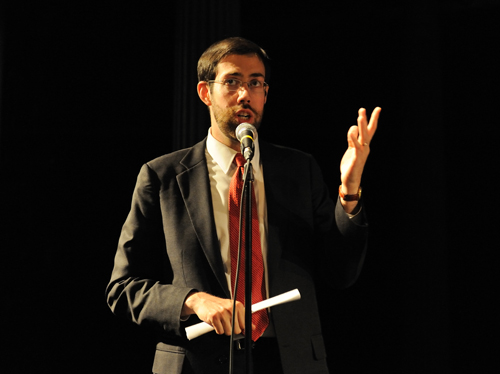
BY COLIN MIXSON
Crusading state Sen. Daniel Squadron finally succeeded in swaying Albany’s Republican-dominated Senate to pass legislation requiring local representation on the Battery Park City Authority in a late-night vote June 21 — but the victory came too late to prevent Gov. Cuomo from packing the current board with an all-outsider slate.
The bill only requires two of the seven seats on the BPCA’s board be filled by actual BPC residents — a far cry from the four-seat majority that locals have demanded for years — but Squadron nonetheless characterized the Senate vote as a major achievement.
“This bill is a big step toward a BPCA board that reflects the value of local governance,” Squadron said.
Members of the BPCA board — which oversees the 92-acre, state-owned community — are not elected but rather nominated by the governor and confirmed by the state Senate.
In his floor speech pushing the bill, Squadron pointed to the only community in the city with a comparable panel to highlight the unique unfairness of Battery Park City’s outsider governance.
“At the Roosevelt Island Operating Corporation, every single member is a resident of Roosevelt Island,” Squadron said. “It is simply not right that these appointments are considered anything other than a local voice for a local community that needs to be governed.”
Legislation requiring community residents on the BPCA board, co-sponsored in the lower chamber this session by assemblymembers Deborah Glick and Yuh-Line Niou, has passed the Assembly before, but always failed to get to a vote in the Republican-controlled Senate, which Squadron described less as oppositional, and more as indifferent to the plight of BPC residents.
“You haven’t seen Republican opposition,” Squadron said, “you’ve seen Republican silence and unwillingness to allow a vote.”
The legislation the Senate finally approved on on June 21 was crafted as a compromise with Corporations, Authorities, and Commissions Committee Chairman Michael Ranzenhofer, who ultimately made the decision to bring the legislation to a vote, according to Squadron spokesman Zeeshan Ott.
A prior incarnation of the bill would have required that residents of Community Board 1 — which also includes Tribeca, the Financial District, and the Seaport District — make up a majority on the BPCA board. The version that ultimately passed requires only two locals on the board, but they must actually live in BPC.
That second change may have had more to do with lobbying from CB1 chairman Anthony Notaro, according to the chairwoman of CB1’s Battery Park City Committee, who said Notaro requested that Squadron language about CB1 and require members dwelling specifically within BPC.
“The bill was amended due to heavy lobbying by Anthony Notaro … to limit it to BPC residents,” said Ninfa Segarra.
Notaro pointed out that the neighborhood, which is build entirely on reclaimed, state-owned land, has an unusual system of ground-leases and quasi-taxes that outsiders may nor fully understand.
“Battery Park City has a unique tax structure and land lease, so we feel that having local residents, not necessarily CB1 residents, serve on the board is the best way of handling representation,” Notaro said.
Squadron’s legislation passed the Senate just one day after his colleagues confirmed Cuomo’s nominations of three new members to fill vacancies on the board — including the seat held until April by Martha Gallo, who was the only BPC resident on the neighborhood’s governing panel. None the new board members live in Battery Park City.
So even if Cuomo does agree to sign the bill into law, it won’t have any immediate effect, until such time as any sitting board members quit or their terms expire.



































